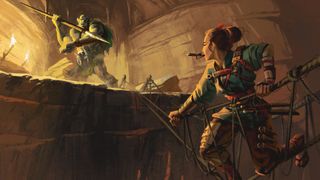An unintended rules change in D&D's new Dungeon Master's Guide can cause your heroic adventurer to drop dead after chasing bad guys for 1 minute—and if they survive, they'll be knackered for days
Finally, some representation!

The D&D 2024 ruleset's Dungeon Master's Guide is releasing November 12—though there's an early access period on D&D Beyond, meaning many players (including myself) have gotten our mitts on it early.
I'm still chewing over this thing, since rulebooks tend to be weighty, and I'll likely be unravelling my full thoughts on this website quite soon. However, I just wanted to step aside for one moment and alert you to the fact that, as this Reddit user Cranyx has identified, it's possible for your new heroic adventurer to get into a chase, get winded in an embarrassingly short amount of time, and then drop dead (thanks, Wargamer).
As per the chase rules laid out in the otherwise quite solid-looking "DM toolbox" chapter explain, players engaging in a chase will be typically spending their action to Dash—unless they're using it to, say, cast a Hold Person spell or something to cut the spell short. As the book reads:
"A chase participant can take the Dash action a number of times equal to 3 plus its Constitution modifier (minimum of once). Each additional Dash action it takes during the chase requires the creature to succeed on a DC 10 Constitution saving throw at the end of its turn or gain 1 Exhaustion level. A participant drops out of the chase if its Speed is 0."
In the new 2024 ruleset, exhaustion does a few key things—all rolls are reduced by twice your exhaustion level, your speed is reduced by five times your exhaustion level (in feet) and, as was the case back in 2014, maxing out your exhaustion at six points kills you dead. Do not collect 100 gold, do not pass GO.
This intersects bizarrely with the chase rules. If you have particularly bad luck, or a terrible con modifier, it's entirely possible to fail a DC 10 constitution save—a 45% chance if you aren't proficient, and your con mod is zero. This means that, if you have six instances of bad luck in a row, running too hard can just straight-up kill you.
The timescale here is also hilarious—as Cranyx rightly points out, each round of combat in D&D is assumed to happen simultaneously over the course of six seconds. You get three freebies, baseline, which means that, in nine turns—assuming you fail when it's time to start rolling, and keep doing that—you would be able to run for a grand total of 54 seconds before the Grim Reaper takes pity and snips your mortal thread with his wicked scythe.
The biggest gaming news, reviews and hardware deals
Keep up to date with the most important stories and the best deals, as picked by the PC Gamer team.
The visual's also pretty funny, given your speed is decreasing each time you mess up. This unlucky runner would be fine for 18 seconds before rapidly slowing, going from a powerful 10 feet per second, to eight feet, to six feet, and so on—until they're stumbling a pitiful 1.5 feet every second. That's one mile per hour, or just twice as fast as a tortoise's average gait in the real world. Six seconds later, you die.
What's more, as a few people in that thread have noticed, there's no clause similar to the 2014 handbook that says you wipe these exhaustion levels after the chase is over. Each point of exhaustion requires a Long Rest to clear, which takes eight hours. Assuming your DM's only letting you do that once per day, even slightly messing up a sprint can put you under the weather for a full working week.
Clearly, there's just been a couple of oversights here—in the 2014 rules, hitting a certain level of exhaustion meant your speed would be reduced to zero before you died, which makes more sense for a chase scene. Eventually, you'd just get winded and have to double over. The change to how exhaustion mechanics work, however, has produced this decidedly unheroic end.
There's also the weird implication that somehow, having an antagonist to chase is way more exhausting than running at the same exact speed while not under duress. Maybe it's just a prolonged bout of chase-induced anxiety, in which case, a Wisdom saving throw would be more appropriate.
Otherwise, I am liking what I'm seeing—the DMG appears to be making genuine attempts to build up a DM's storytelling toolkit, something I've complained about at length. I'm excited to discover whether it's succeeded at that or not in the reading sessions to come. I won't rush myself, lest I fail six saves and succumb to momentum apathy like Granthax the Barbarian, may he rest in peace.

Harvey's history with games started when he first begged his parents for a World of Warcraft subscription aged 12, though he's since been cursed with Final Fantasy 14-brain and a huge crush on G'raha Tia. He made his start as a freelancer, writing for websites like Techradar, The Escapist, Dicebreaker, The Gamer, Into the Spine—and of course, PC Gamer. He'll sink his teeth into anything that looks interesting, though he has a soft spot for RPGs, soulslikes, roguelikes, deckbuilders, MMOs, and weird indie titles. He also plays a shelf load of TTRPGs in his offline time. Don't ask him what his favourite system is, he has too many.
Most Popular






